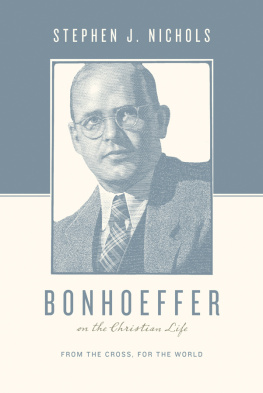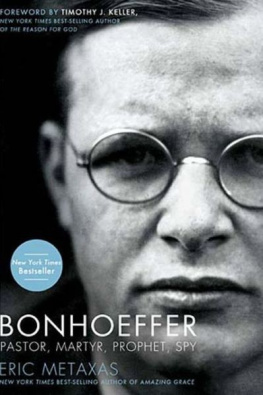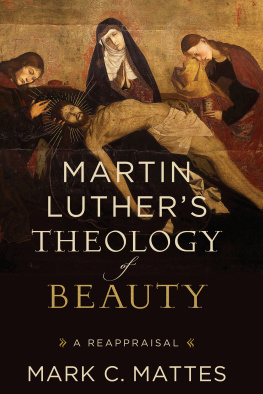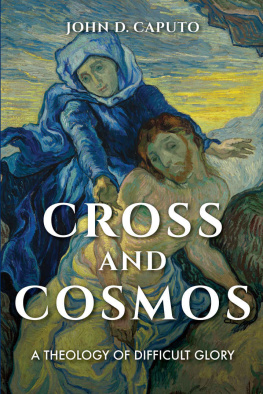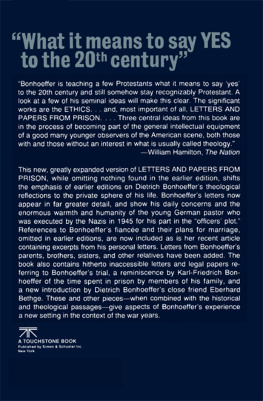The Cross of Reality
Luther's Theologia Crucis and Bonhoeffer's Christology
H. Gaylon Barker
Fortress Press
Minneapolis
THE CROSS OF REALITY
Luthers Theologia Crucis and Bonhoeffers Christology
Copyright 2015 Fortress Press. All rights reserved. Except for brief quotations in critical articles or reviews, no part of this book may be reproduced in any manner without prior written permission from the publisher. Visit http://www.augsburgfortress.org/copyrights/ or write to Permissions, Augsburg Fortress, Box 1209, Minneapolis, MN 55440.
Excerpts from Alister E. McGrath, Luthers Theology of the Cross: Martin Luthers Theological Breakthrough (Oxford: Basil Blackwell, 1985), copyright Wiley Blackwell, are used with permission.
Cover image: The Sermon (Luther is Preaching), Lucas Cranach the Elder (1472-1553 German), Church of St. Marien in Wittenberg, German, SuperStock / SuperStock
Cover design: Tory Herman
Library of Congress Cataloging-in-Publication Data
Print ISBN: 978-1-4514-8880-7
eBook ISBN: 978-1-5064-0049-5
The paper used in this publication meets the minimum requirements of American National Standard for Information Sciences Permanence of Paper for Printed Library Materials, ANSI Z329.48-1984.
Manufactured in the U.S.A.
This book was produced using Pressbooks.com.
To Carla
Wife, Colleague, Friend
Contents
This book, which is a revision of my doctoral dissertation, has a long history. The seed was first planted in seminary while serving as student assistant to James Burtness, who at that time was working on Lutheran themes in Bonhoeffers thought. Over the years, the ideas presented here were nurtured through presentations at churches and conferences, and most especially in conversations with James Burtness, Larry Rasmussen, Eberhard Bethge, Wolfgang Huber, Ernst Feil, John Godsey, Michael Ryan, and Gerhard Ebeling, among others, who both encouraged and helped to formulate the ideas that lie at the heart of this work.
Therefore, while any limitations in this work remain the responsibility of the author, since no work is done in complete independence, acknowledgments and thanks are an appropriate way to begin. In addition to those mentioned above, friends and colleagues from the various International Bonhoeffer Societies, which continue to provide inspiration and resources to continually reflect on Bonhoeffers legacy, remain constant conversation partners. Additional thanks are owed to the library staffs of Luther Theological Seminary, Drew University, Union Theological Seminary, the University of Heidelberg, and Molloy College. Thanks go to the editorial staff at Fortress Press as well. Through the thoughtful work of Will Bergkamp, Michael Gibson, Lisa Gruenisen, and Travis Ables, along with the others at Fortress Press, the process of bringing this work to publication has been a reward in itself. Finally, the greatest and most sincere thanks goes to my wife, Carla, who has provided assistance and inspiration all along the way. Without her, this project would never have reached completion; therefore, it is to her that this work is dedicated.
Gaylon Barker
Ridgefield, CT
April 9, 2015
Seventieth anniversary of Dietrich Bonhoeffers death
| AC | Augsburg Confession, in The Book of Concord |
| BC | The Book of Concord: The Confessions of the Evangelical Lutheran Church. Edited by Robert Kolb and Timothy J. Wengert. Minneapolis: Fortress Press, 2000. |
| FC | Formula of Concord, in The Book of Concord |
| DB-ER | Dietrich Bonhoeffer: A Biography. Revised edition by Eberhard Bethge. Minneapolis: Fortress Press, 2000. |
| DBW | Dietrich Bonhoeffer Werke, German edition |
| DBWE | Dietrich Bonhoeffer Works, English edition |
| SC | Sanctorum Communio. Vol. 1 of DBWE |
| AB | Act and Being. Vol. 2 of DBWE |
| LT | Life Together. Volume 5, part 1 of DBWE |
| LPP | Letters and Papers from Prison. Vol. 8 of DBWE |
| GS | Gesammelte Schriften. 6 vols. Munich: Kaiser Verlag, 195874. |
| LW | American Edition of Luthers Works. St. Louis: Concordia Publishing House; Philadelphia: Fortress Press, 195586. |
| TDB | Ernst Feil. Theology of Dietrich Bonhoeffer. Translated by Martin Rumscheidt. Philadelphia: Fortress Press, 1985. |
| TF | A Testament to Freedom: The Essential Writings of Dietrich Bonhoeffer. Revised edition. Edited by Geffrey B. Kelly and F. Burton Nelson. New York: HarperCollins, 1995. |
| WA | D. Martin Luthers Werke. Kritische Gesamtausgabe. Weimar: Bhlaus, 18831957. |
Toward the end of his life, in a letter written on April 30, 1944, Dietrich Bonhoeffer posed the question that may well serve as a summary of his life and his theology: What keeps gnawing at me is the question, what is Christianity, or who is Christ actually for us today? marked by an intense concentration on the person Jesus and the cross. In both his life and his theology, Bonhoeffer was concerned to give expression to the presence of the living Christ in the world.
Bonhoeffers question is our question. Each generation of Christian believers, indeed every believer, must answer that question for themselves, which is what the church has been doing for nearly two thousand years. Reflecting on the biblical witness, the early church spent centuries sorting out the various answers to that question.
The answer Bonhoeffer arrives at is a particular Christology, shaped by the tradition with which he identified. It was on based solidly on Luthers theologia crucis (theology of the cross), with the communicatio idiomatum (communication of attributes) at its center. in the theological letters from Tegel prison, where he was imprisoned after his arrest in 1943.
While finding his answer in Luthers theologia crucis, at the same time Bonhoeffer recognized the difference between Luthers time and his own. In the same letter, he acknowledges that the time of religion is past. We are approaching a completely religionless age; people as they are now simply cannot be religious anymore. Even those who honestly describe themselves as religious arent really practicing that at all; they presumably mean something quite different by religious. In fact, the foundations are being pulled out from under all that Christianity has previously been for us, and the only people among whom we might end up in terms of religion are the last of the knights or a few intellectually dishonest people. This means that Bonhoeffers goal was not simply to replicate Luthers theology; however, what he finds in Luther is the key to unlocking the churchs witness for this new time.
Seen in this light, the challenging and, to some, disturbing thoughts at the end of his life, rather than marking a decisive break from his earlier theological formulations, were the culmination of his theological orientation. Because God in Christ is never absent or detached from the world but is intimately involved with the world, Bonhoeffers theology was always contextual. He never dealt with the traditions of the church simply as doctrines to be handed down from one generation to the next as if they were entities separated from the lives of people and of daily living; Christian doctrine, if it was to be true to Christ, was to be placed in the service of Christian living. This, in turn, necessitated giving attention to matters like reality and the world, which for Bonhoeffer were simply opposite sides of the same coin.


